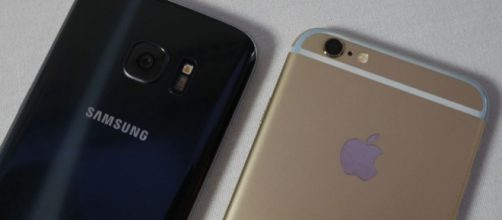Samsung’s flagship device, the Galaxy S8 and the Galaxy S8+ smartphone will be officially released on April 21. Both devices are considered the most premium smartphones of 2017, with regard to their design, features, and specs. However, people may wonder how the battery life of the flagships hold up against current premium devices from other companies.
A recent test conducted by Phone Arena highlighted both the battery quality as well as the charging capabilities of the Galaxy S8 and the Galaxy S8+. To conduct the test, the publication used the Exynos 8895 variants of the devices, and not the Snapdragon 835 equipped models, which means that the international variant and not the United States one was used.
It is also important to note that both devices were set to the HD+ resolution (i.e. 1080 x 2220 pixels).
The battery test
The Galaxy S8 has a 3,000 mAh battery and the bigger sibling a 3,500 mAh one. In the test, both the smartphones reflected similar results in terms of battery life. The Galaxy S8’s battery lasted for 8 hours 23 minutes, whereas the bigger sibling's battery ran out after 8 hours. The Galaxy S7 edge lasted 7 hours and 18 minutes in the same test. Therefore, it appears Samsung managed to improve the overall battery life for the flagships.
Both the Samsung flagships for 2017 also managed to surpass other devices, including the Google Pixel XL, which lasted 7 hours and 19 minutes.
By comparison, the One Plus 3T’s battery life was 5 hours and 41 minutes, and Apple’s iPhone 7 had a battery life of 7 hours and 46 minutes. However, the latest Samsung smartphones were unable to beat the iPhone 7 Plus’ battery life, which stood at an impressive 9 hours and 5 minutes.
Charging time test
Phone Arena also performed a test to determine how long both the devices took to get fully charged.
This was based on its quick ability to charge completely from 0 to 100 percent. The less time a device took to charge was seen as the benchmark for this test.
The test found that the Galaxy S8 and the Galaxy S8+ were able to get charged within 1 hour and 40 minutes. Both flagships offer support for Samsung’s Fast Adaptive Charging, which perhaps aided in keeping charging times relatively low.
In its charging ability as well, Samsung’s premium handsets managed to outperform most of its competition. Only the LG V20 (86 minutes) and OnePlus 3T (85 minutes) devices had lower charging times. The iPhone 7 Plus did not fare too well on this parameter and was outperformed by the Samsung smartphones.

